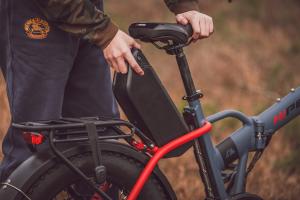
HiPEAK’s Environmental Responsibility: How Important Is It to Recycle E-bike Batteries Properly?
The above also applies to electric bike batteries. Whether you are upgrading your first adult electric bike to a new fat-tire electric bike or purchasing new batteries to replace old ones, you may face the question, "How should I dispose of my electric bike battery?" Obviously, you can't just throw them in the regular trash bin. Next, HiPeak will tell you why!
What are e-bike batteries made of?
Just as bicycle frames are crafted from ores, various alloy materials, and then transformed into the sleek products we see on the market, electric bike batteries also go through a process of sourcing different raw materials and are meticulously designed to appear more fashionable and streamlined. Their performance is largely determined by their manufacturing materials. Here are the three primary types of folding electric bike batteries that are currently prevalent in the market.
Lead batteries
Lead was one of the earliest materials used in battery manufacturing. However, due to its low capacity and weight, lead batteries have become increasingly uncommon. One advantage of lead batteries, though, is that they are among the easiest batteries to recycle compared to other types of batteries.
Nickel-cadmium batteries
Nickel-cadmium batteries have higher capacity and can store more energy than lead batteries, making electric bikes equipped with them an ideal choice for people for a time. However, nickel-cadmium is an expensive material that significantly increases the manufacturing cost of fat-tire electric bikes. Moreover, nickel-cadmium materials are difficult to recycle, so many electric bike manufacturers are now abandoning nickel-cadmium batteries.
Lithium-ion battery
Lithium-ion batteries are considered the best battery material currently available as they can maintain optimal capacity and performance at an ideal weight. As a result, lithium-ion batteries have now become the standard batteries for all electronic products, including electric bikes. For instance, the HiPeak BONA folding electric bike is equipped with a large-capacity 48V 15Ah lithium-ion battery, which not only keeps the weight and portability of the BONA at an optimal level but also provides an impressive range of up to 60 miles.
Why it’s important to handle electric bike batteries properly?
The project is huge
Battery recycling is not as simple as collecting a few batteries. Before understanding the importance of battery recycling, it's important to realize the magnitude of this undertaking. In the case of HiPeak, since its establishment, it has served over 800,000 riders and sold over a million electric bikes. This means that there are over a million batteries powering HiPeak's folding electric bikes, which need to be recycled when the bikes reach the end of their life cycle. Therefore, HiPeak has always placed great importance on battery recycling and environmental protection.
Polluting the earth
As mentioned earlier, currently the vast majority of adult electric bicycles, including HiPeak, use lithium-ion batteries. Due to their unique chemical properties, if not handled properly, lithium-ion batteries can cause harm to humans and the environment. If they are casually thrown into regular trash bins, these batteries will eventually end up in landfills, where they will decay and leak chemicals into the soil, thereby contaminating water sources and soil. Additionally, they take 100 years to fully decompose, so these chemicals will continue to pollute the Earth.
Furthermore, due to their combustion characteristics, when these batteries eventually are dumped into landfills, they may also cause significant fire losses. However, proper recycling of these batteries can help extract battery materials and distribute them to the manufacturing of new products, creating new economic benefits while reducing pollution.
Legal risks
Nowadays, environmental protection has become a global concern, and corresponding measures have been implemented worldwide. In the United States, more and more states and cities have enacted laws and regulations regarding battery recycling. If you do not handle or recycle electric bicycle batteries properly, you are likely to face fines.
How does HiPEAK handle electric bike batteries
As a fat tire electric bike company, HiPeak has always been committed to environmental protection and sustainable development since its establishment. During the manufacturing process, HiPeak insists on using the most advanced battery technology and special battery protection devices to prevent deep discharge, overheating, and leakage, in order to avoid unnecessary damage and pollution.
In terms of battery recycling, HiPeak also takes the handling of electric bicycle batteries seriously, just as it does in the manufacturing process. Whether expired or damaged batteries, HiPeak takes appropriate preventive measures to ensure that they leave the warehouse safely and reach professional recycling centers. Additionally, HiPeak provides 24/7 customer service to provide users with the best practices for recycling electric bicycle batteries and information on where to recycle old batteries safely and cleanly.
If your are reading this article, you’re likely one of the many current or potential electric bike consumers. In fact, as a consumer, even a small action can have a significant impact. This is because it is predicted that over 12 billion e-bikes will be sold in the US market from 2020 to 2023, and how these batteries are properly disposed of will be a challenge people will face. As a responsible company, HiPeak hopes to work with every user to make the transition to a greener lifestyle easy!
HIPEAK BIKE
HIPEAKBIKE
+ +1 213-531-5992
support@hipeakbike.com
Visit us on social media:
Facebook
Instagram
YouTube
HiPEAK BONA & ELIAS 750W 48V 15Ah Fat Tire Folding E-bikes
Distribution channels: Automotive Industry, Culture, Society & Lifestyle, Environment, Technology, Travel & Tourism Industry
Legal Disclaimer:
EIN Presswire provides this news content "as is" without warranty of any kind. We do not accept any responsibility or liability for the accuracy, content, images, videos, licenses, completeness, legality, or reliability of the information contained in this article. If you have any complaints or copyright issues related to this article, kindly contact the author above.
Submit your press release


